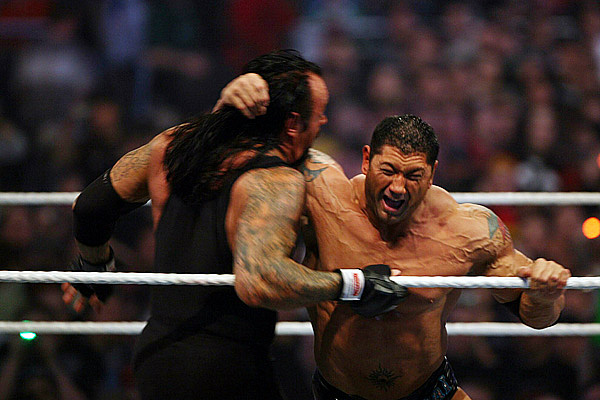Batista and the Circus Circuit
Jake Rossen Jun 22, 2010

Dave Batista: Heather Rousseau/Splash News
Advertisement
But now Batista’s WWE contract has expired, and despite his prior careers not giving him a lot of leeway, he appears interested in pursuing a career as a professional fighter. He told TMZ.com over the weekend -- in a very vague, sleepy way -- that he was headed to Strikeforce, though he left out important qualifiers like “I have signed,” or “I have a deal.” Like Kurt Angle before him, Batista might simply be enjoying the attention that comes with having intentions to fight.
If he chooses to, he’ll be joining a pretty ignoble group of
sideshow attractions that appear to be multiplying. (When the sport
needed to pull this kind of stunt in the 1990s, they were nowhere
to be found. Go figure.) Herschel
Walker, serious as he appears to be, is still a guest star in a
show he doesn’t really belong in; Kimbo
Slice, Jose
Canseco, and James Toney
all have reasons never to set foot inside a cage. If you’re a real
purist, their participation can almost be seen as a perversion of
the sport’s blue-collar mentality: work hard, fight hard, earn
something. Bringing and using notoriety from another industry
almost seems like a cheat.
In this way, the MMA business of 2010 is beginning to mimic what Japan had relied on for years: hiring recognizable faces to fight with the expectation that the attention they bring will have an effect on the rest of the roster. Fans despise Nobuhiko Takada, the pro wrestler who engaged in alternately suspect and horrible fights in Pride -- but without his participation, it’s unlikely the promotion would’ve ever survived long enough to introduce a talent like Kazushi Sakuraba or Wanderlei Silva to a wide audience.
And just as Takada against Rickson Gracie sold more tickets than any “legitimate” fight possible with two qualified athletes that same night, Fedor Emelianenko vs. Fabricio Werdum would be dwarfed in the ratings by Kimbo Slice against Batista. It’s nauseating, but what opportunities could those two provide for everyone on the undercard?
Batista, naturally, is far less equipped to compete than even Takada, who -- along with Sakuraba and dozens of others -- benefited from a stiffer pro wrestling style in Japan that had athletes learning real catch wrestling and striking moves, even if the goal was to pull back on them in a match. In terms of matchmaking, he’s as fragile as glass. But I doubt fans would much care.
It’s a forgivable concession to the attention span of casual viewers, but these are all names that paint the competency level of mixed martial arts in a very suspicious light. Batista would probably never dream of entering professional boxing, football, or any one of a dozen sports. But MMA is some kind of refuge for amateurs.
At least he’s being pragmatic about his chances. When asked by the TMZ camera operator what he thought about fighting Emelianenko, he didn’t have to think.
“I want,” he said, “nothing to do with that dude.”







